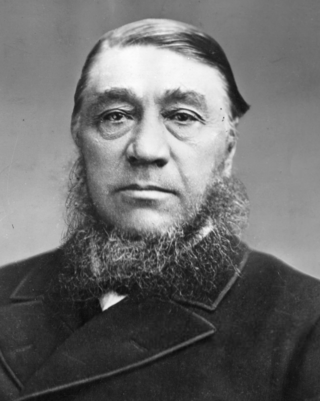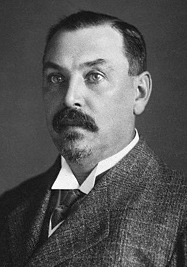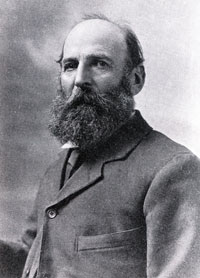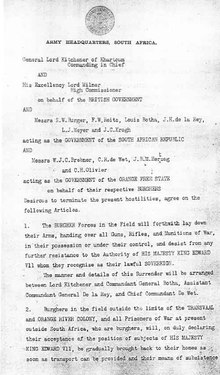
The South African Republic, also known as the Transvaal Republic, was an independent Boer republic in Southern Africa which existed from 1852 to 1902, when it was annexed into the British Empire as a result of the Second Boer War.

The Second Boer War, also known as the Boer War, Anglo–Boer War, or South African War, was a conflict fought between the British Empire and the two Boer republics over the Empire's influence in Southern Africa.

The Transvaal Colony was the name used to refer to the Transvaal region during the period of direct British rule and military occupation between the end of the Second Boer War in 1902 when the South African Republic was dissolved, and the establishment of the Union of South Africa in 1910. The borders of the Transvaal Colony were larger than the defeated South African Republic. In 1910 the entire territory became the Transvaal Province of the Union of South Africa.

Stephanus Johannes Paulus Kruger, better known as Paul Kruger, was a South African politician. He was one of the dominant political and military figures in 19th-century South Africa, and State President of the South African Republic from 1883 to 1900. Nicknamed Oom Paul, he came to international prominence as the face of the Boer cause—that of the Transvaal and its neighbour the Orange Free State—against Britain during the Second Boer War of 1899–1902. He has been called a personification of Afrikanerdom, and remains a controversial figure; admirers venerate him as a tragic folk hero.

The Orange Free State was an independent Boer sovereign republic under British suzerainty in Southern Africa during the second half of the 19th century, which ceased to exist after it was defeated and surrendered to the British Empire at the end of the Second Boer War in 1902. It is one of the three historical precursors to the present-day Free State province.

The Orange River Colony was the British colony created after Britain first occupied (1900) and then annexed (1902) the independent Orange Free State in the Second Boer War. The colony ceased to exist in 1910, when it was absorbed into the Union of South Africa as the Orange Free State Province.

The Boer republics were independent, self-governing republics formed by Dutch-speaking inhabitants of the Cape Colony and their descendants. The founders – variously named Trekboers, Boers and Voortrekkers – settled mainly in the middle, northern, north-eastern and eastern parts of present-day South Africa. Two of the Boer republics achieved international recognition and complete independence: the South African Republic and the Orange Free State. The republics did not provide for the separation of church and state, initially allowing only the Dutch Reformed Church, and later also other Protestant churches in the Calvinist tradition. The republics came to an end after the Second Boer War of 1899–1902, which resulted in British annexation and later incorporation of their lands into the Union of South Africa.

Louis Botha was a South African politician who was the first prime minister of the Union of South Africa – the forerunner of the modern South African state. A Boer war veteran during the Second Boer War, he eventually fought to have South Africa become a British Dominion.

Jacobus Herculaas de la Rey, better known as Koos de la Rey, was a South African military officer who served as a Boer general during the Second Boer War. De la Rey also had a political career and was one of the leading advocates of Boer independence.

Alfred Milner, 1st Viscount Milner, was a British statesman and colonial administrator who played a very important role in the formulation of British foreign and domestic policy between the mid-1890s and early 1920s. From December 1916 to November 1918, he was one of the most important members of Prime Minister David Lloyd George's War cabinet.

Milner's Kindergarten is the informal name of a group of Britons who served in the South African civil service under High Commissioner Alfred, Lord Milner, between the Second Boer War and the founding of the Union of South Africa in 1910. It is possible that the kindergarten was Colonial Secretary Joseph Chamberlain's idea, for in his diary dated 14 August 1901, Chamberlain's assistant secretary Geoffrey Robinson wrote, "Another long day occupied chiefly in getting together a list of South African candidates for Lord Milner – from people already in the (Civil) Service". They were in favour of the unification of South Africa and, ultimately, an Imperial Federation with the British Empire itself. On Milner's retirement, most continued in the service under Lord Selborne, who was Milner's successor, and the number two-man at the Colonial Office. The Kindergarten started off with 12 men, most of whom were Oxford graduates and English civil servants, who made the trip to South Africa in 1901 to help Lord Milner rebuild the war torn economy. Quite young and inexperienced, one of them brought with him a biography written by F.S. Oliver on Alexander Hamilton. He read the book, and the plan for rebuilding the new government of South Africa was based along the lines of the book, Hamilton's federalist philosophy, and his knowledge of treasury operations. The name, "Milner's Kindergarten", although first used derisively by Sir William Thackeray Marriott, was adopted by the group as its name.
The following lists events that happened during 1900 in South Africa.
Jan Christiaan Smuts, OM was a prominent South African and Commonwealth statesman and military leader. He served as a Boer general during the Boer War, a British general during the First World War and was appointed field marshal during the Second World War. In addition to various cabinet appointments, he served as prime minister of the Union of South Africa from 1919 to 1924 and from 1939 to 1948. He played a leading part in the post war settlements at the end of both world wars, making significant contributions towards the creation of both the League of Nations and the United Nations.
Jan Christiaan Smuts, OM was a prominent South African and Commonwealth statesman and military leader. He served as a Boer General duning the Boer War, a British General during the First World War and was appointed Field Marshal during the Second World War. In addition to various Cabinet appointments, he served as Prime Minister of the Union of South Africa from 1919 to 1924 and from 1939 to 1948. He played a leading part in the post war settlements at the end of both world wars, making significant contributions towards the creation of both the League of Nations and the United Nations.

The Pretoria Convention was the peace treaty that ended the First Boer War between the Transvaal Boers and Great Britain. The treaty was signed in Pretoria on 3 August 1881, but was subject to ratification by the Volksraad within 3 months from the date of signature. The Volksraad first raised objections to a number of the clauses of the treaty, but did eventually ratify the version signed in Pretoria, after Britain refused any further concessions or changes to the treaty.

The Bloemfontein Conference was a meeting that took place at the railway station of Bloemfontein, capital of the Orange Free State from 31 May until 5 June 1899. The main issue dealt with the status of British migrant workers called "Uitlanders", who mined the gold fields in Transvaal.

The military history of Australia during the Boer War is complex, and includes a period of history in which the six formerly autonomous British Australian colonies federated to become the Commonwealth of Australia. At the outbreak of the Second Boer War, each of these separate colonies maintained their own, independent military forces, but by the cessation of hostilities, these six armies had come under a centralised command to form the Australian Army.

The Statue of Paul Kruger is a bronze sculpture located in Church Square in Pretoria, South Africa. The statue depicts Paul Kruger, the Boer political and military leader and President of the South African Republic from 1883 to 1900, and four unnamed Boer soldiers. The Statue of Paul Kruger was sculpted in 1896 and was installed in its current location in Church Square in 1954.

Christiaan Botha was a younger brother of Louis Botha (1862–1919) and Philip Botha (1851-1901), but an older brother of Theunis Jacobus Botha (1867-1930), and likewise a Boer general in the Second Boer War (1899–1902) who then both fought the British to the end.
Henry Charles Hull was the first South African Minister of Finance when the Union of South Africa was formed in March 1910. He served in the first Louis Botha cabinet. He assisted in drafting of South Africa's first constitution. He was a lawyer, politician, and mining financier. He assisted in the formation of Anglo American plc.

















